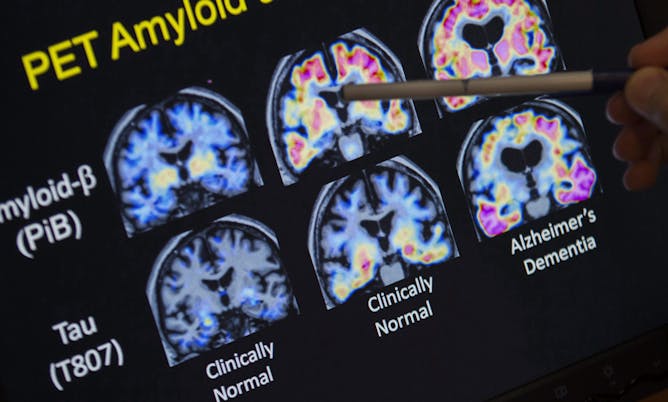|
When you think of Alzheimer’s disease, you likely think of the brain. But Alzheimer’s may not be primarily a disease of the brain. It might be an autoimmune condition: a disease of the immune system within the brain. It’s an approach that moves beyond the beta-amyloid focus that, until it recently came under scrutiny, was the focus of much Alzheimer’s disease.
Today in The Conversation Canada, Donald Weaver of the University of Toronto explains the evidence for Alzheimer’s disease as an autoimmune condition. The beta-amyloid proteins still play a role, but they are not an invasive foreign presence. Rather, they are a natural part of the brain’s immune system. However, they might sometimes have difficulty telling friend from foe:
“Because of striking similarities between the fat molecules that make up both the membranes of bacteria and the membranes of brain cells, beta-amyloid cannot tell the difference between invading bacteria and host brain cells, and mistakenly attacks the very brain cells it is supposed to be protecting.”
Also today:
Regards,
|

A new theory of Alzheimer’s disease reassesses the role of beta-amyloid in the brain.
(AP Photo/Evan Vucci)
Donald Weaver, University of Toronto
Alzheimer’s may not be primarily a disease of the brain. It may be a disorder of the immune system within the brain. Beta-amyloid may not be an abnormal protein, but part of the brain’s immune system.
|

The film is loosely based on a chapter from the book ‘Mafia Queens of Mumbai.’
(Pen Movies/YouTube)
Rajeshwari Nandkumar, McMaster University
Despite portraying sex workers as agents of social change, Sanjay Leela Bhansali’s ‘Gangubai Kathiawadi’ presents sex workers as worthy victims because they didn’t choose their disreputable fates.
|

Funding research is essential to meet future health challenges.
(Shutterstock)
John Bergeron, McGill University
Canadian scientists have made significant contributions during the pandemic response, including vital roles in developing COVID-19 vaccines. But underfunding puts the future of science in Canada at risk.
|

The ‘othering’ of women through misogyny, racism and sexism in scholarship has had, and continues to have, serious consequences on women’s lives.
(Shutterstock)
Jacquie Gahagan, Mount Saint Vincent University; Adwoa Onuora, Mount Saint Vincent University; Tegan Zimmerman, Mount Saint Vincent University
Women’s studies programs should continue to be supported to ensure the fight for women’s rights are not reversed or forgotten.
|

Le télétravail, qui est un avantage souhaité par la majorité de ceux qui l’ont expérimenté, facilite la conciliation de plusieurs parents.
(Shutterstock)
Sophie Mathieu, Université TÉLUQ ; Diane-Gabrielle Tremblay, Université TÉLUQ
La proportion des parents se disant ouverts à une baisse de salaire en échange de meilleures mesures de conciliation a chuté à 31 % en juin 2020, et stagné à 27 % en mai 2021 et 2022.
|
Ukraine Invasion
|
-
Christopher Michaelsen, UNSW Sydney
The exact impact of sanctions is always difficult to assess in the short-term. But there are signs it is an effective strategy against Russia – and the only real option.
|
|
Arts
|
-
James Clifford Kent, Royal Holloway University of London
An award-winning photographer reflects on iconic images of the late monarch and pictures a nation in mourning
|
|
Business + Economy
|
-
Gökçin Çınar, University of Michigan
Air Canada and United Airlines both have orders for hybrid electric 30-seaters. An aerospace engineer explains where electrification, hydrogen and sustainable aviation fuels are headed.
|
|
Politics
|
-
Mohamad Moustafa Alabsi, Fondation Maison des Sciences de l'Homme (FMSH)
Two academics have identified the perpetrators of a massacre committed in 2013 by Syrian loyalist forces – an episode that says a lot about the reality of Syria in the last 10 years.
|
|